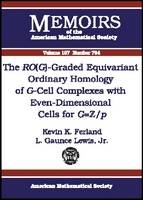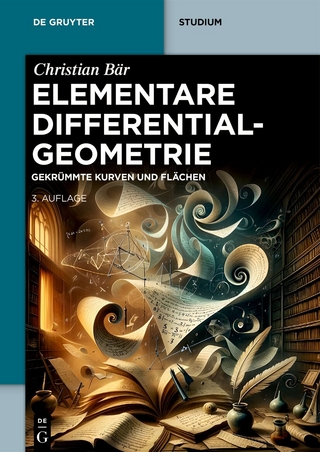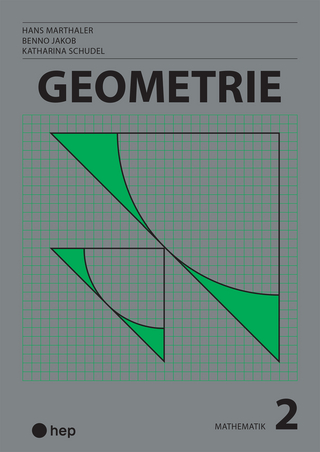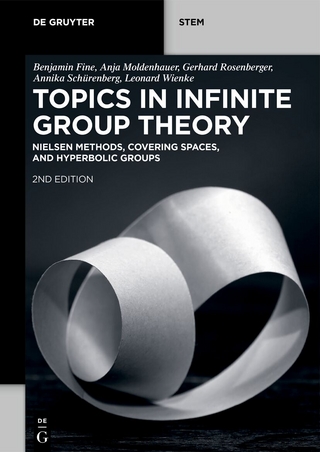
The RO(G)-graded Equivariant Ordinary Homology of G-cell Complexes with Even-dimensional Cells for G=Z/p
2003
American Mathematical Society (Verlag)
978-0-8218-3461-9 (ISBN)
American Mathematical Society (Verlag)
978-0-8218-3461-9 (ISBN)
- Titel ist leider vergriffen;
keine Neuauflage - Artikel merken
It is well known that the homology of a CW-complex with cells only in even dimensions is free. The equivariant analog of this result for $G$-cell complexes is, however, not obvious, since $RO(G)$-graded homology cannot be computed using cellular chains. This book considers $G = /mathbb{Z}/p$ and studies $G$-cell complexes.
It is well known that the homology of a CW-complex with cells only in even dimensions is free. The equivariant analog of this result for $G$-cell complexes is, however, not obvious, since $RO(G)$-graded homology cannot be computed using cellular chains. We consider $G = /mathbb{Z}/p$ and study $G$-cell complexes constructed using the unit disks of finite dimensional $G$-representations as cells. Our main result is that, if $X$ is a $G$-complex containing only even-dimensional representation cells and satisfying certain finiteness assumptions, then its $RO(G)$-graded equivariant ordinary homology $H_/ast^G(X;A>$ is free as a graded module over the homology $H_/ast$ of a point.This extends a result due to the second author about equivariant complex projective spaces with linear $/mathbb{Z}/p$-actions. Our new result applies more generally to equivariant complex Grassmannians with linear $/mathbb{Z}/p$-actions. Two aspects of our result are particularly striking. The first is that, even though the generators of $H^G_/ast(X;A)$ are in one-to-one correspondence with the cells of $X$, the dimension of each generator is not necessarily the same as the dimension of the corresponding cell. This shifting of dimensions seems to be a previously unobserved phenomenon. However, it arises so naturally and ubiquitously in our context that it seems likely that it will reappear elsewhere in equivariant homotopy theory. The second unexpected aspect of our result is that it is not a purely formal consequence of a trivial algebraic lemma.Instead, we must look at the homology of $X$ with several different choices of coefficients and apply the Universal Coefficient Theorem for $RO(G)$-graded equivariant ordinary homology. In order to employ the Universal Coefficient Theorem, we must introduce the box product of $RO(G)$-graded Mackey functors. We must also compute the $RO(G)$-graded equivariant ordinary homology of a point with an arbitrary Mackey functor as coefficients. This, and some other basic background material on $RO(G)$-graded equivariant ordinary homology, is presented in a separate part at the end of the memoir.
It is well known that the homology of a CW-complex with cells only in even dimensions is free. The equivariant analog of this result for $G$-cell complexes is, however, not obvious, since $RO(G)$-graded homology cannot be computed using cellular chains. We consider $G = /mathbb{Z}/p$ and study $G$-cell complexes constructed using the unit disks of finite dimensional $G$-representations as cells. Our main result is that, if $X$ is a $G$-complex containing only even-dimensional representation cells and satisfying certain finiteness assumptions, then its $RO(G)$-graded equivariant ordinary homology $H_/ast^G(X;A>$ is free as a graded module over the homology $H_/ast$ of a point.This extends a result due to the second author about equivariant complex projective spaces with linear $/mathbb{Z}/p$-actions. Our new result applies more generally to equivariant complex Grassmannians with linear $/mathbb{Z}/p$-actions. Two aspects of our result are particularly striking. The first is that, even though the generators of $H^G_/ast(X;A)$ are in one-to-one correspondence with the cells of $X$, the dimension of each generator is not necessarily the same as the dimension of the corresponding cell. This shifting of dimensions seems to be a previously unobserved phenomenon. However, it arises so naturally and ubiquitously in our context that it seems likely that it will reappear elsewhere in equivariant homotopy theory. The second unexpected aspect of our result is that it is not a purely formal consequence of a trivial algebraic lemma.Instead, we must look at the homology of $X$ with several different choices of coefficients and apply the Universal Coefficient Theorem for $RO(G)$-graded equivariant ordinary homology. In order to employ the Universal Coefficient Theorem, we must introduce the box product of $RO(G)$-graded Mackey functors. We must also compute the $RO(G)$-graded equivariant ordinary homology of a point with an arbitrary Mackey functor as coefficients. This, and some other basic background material on $RO(G)$-graded equivariant ordinary homology, is presented in a separate part at the end of the memoir.
Part 1. The Homology of $/mathbb{Z}/p$-Cell Complexes with Even-Dimensional Cells: Preliminaries The main freeness theorem (Theorem 2.6) An outline of the proof of the main freeness result (Theorem 2.6) Proving the single-cell freeness results Computing $H^G_/ast(B/cup DV; A)$ in the key dimensions Dimension-shifting long exact sequences Complex Grassmannian manifolds Part 2. Observations about $RO(G)$-Graded Equivariant Ordinary Homology: The computation of $H^S_/ast$ for arbitrary $S$ Examples of $H^S_/ast$ $RO(G)$-graded box products A weak Universal Coefficient Theorem Observations about Mackey functors Bibliography.
| Erscheint lt. Verlag | 1.4.2004 |
|---|---|
| Reihe/Serie | Memoirs of the American Mathematical Society |
| Zusatzinfo | illustrations |
| Verlagsort | Providence |
| Sprache | englisch |
| Themenwelt | Mathematik / Informatik ► Mathematik ► Geometrie / Topologie |
| ISBN-10 | 0-8218-3461-4 / 0821834614 |
| ISBN-13 | 978-0-8218-3461-9 / 9780821834619 |
| Zustand | Neuware |
| Haben Sie eine Frage zum Produkt? |
Mehr entdecken
aus dem Bereich
aus dem Bereich
Gekrümmte Kurven und Flächen
Buch | Softcover (2024)
De Gruyter (Verlag)
54,95 €
Nielsen Methods, Covering Spaces, and Hyperbolic Groups
Buch | Softcover (2024)
De Gruyter (Verlag)
109,95 €


